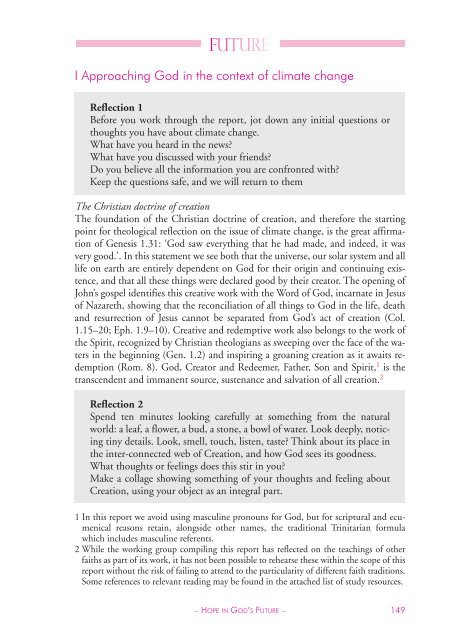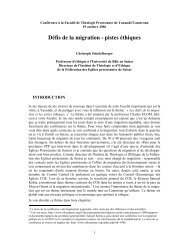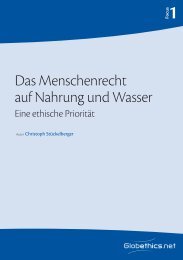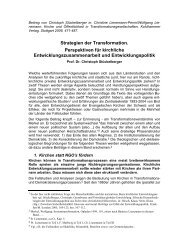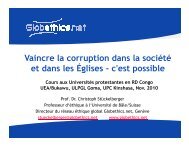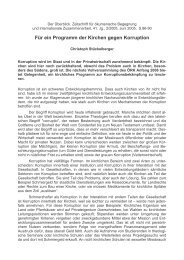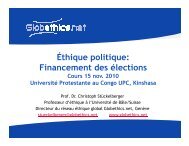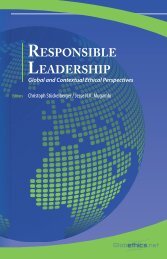BREAK THE CHAINS OF OPPRESION AND THE YOKE OF ...
BREAK THE CHAINS OF OPPRESION AND THE YOKE OF ...
BREAK THE CHAINS OF OPPRESION AND THE YOKE OF ...
Create successful ePaper yourself
Turn your PDF publications into a flip-book with our unique Google optimized e-Paper software.
FuturE I Approaching God in the context of climate change<br />
Reflection 1<br />
Before you work through the report, jot down any initial questions or<br />
thoughts you have about climate change.<br />
What have you heard in the news?<br />
What have you discussed with your friends?<br />
Do you believe all the information you are confronted with?<br />
Keep the questions safe, and we will return to them<br />
The Christian doctrine of creation<br />
The foundation of the Christian doctrine of creation, and therefore the starting<br />
point for theological reflection on the issue of climate change, is the great affirmation<br />
of Genesis 1.31: ‘God saw everything that he had made, and indeed, it was<br />
very good.’. In this statement we see both that the universe, our solar system and all<br />
life on earth are entirely dependent on God for their origin and continuing existence,<br />
and that all these things were declared good by their creator. The opening of<br />
John’s gospel identifies this creative work with the Word of God, incarnate in Jesus<br />
of Nazareth, showing that the reconciliation of all things to God in the life, death<br />
and resurrection of Jesus cannot be separated from God’s act of creation (Col.<br />
1.15–20; Eph. 1.9–10). Creative and redemptive work also belongs to the work of<br />
the Spirit, recognized by Christian theologians as sweeping over the face of the waters<br />
in the beginning (Gen. 1.2) and inspiring a groaning creation as it awaits redemption<br />
(Rom. 8). God, Creator and Redeemer, Father, Son and Spirit, 1 is the<br />
transcendent and immanent source, sustenance and salvation of all creation. 2<br />
� � � � �<br />
Reflection 2<br />
Spend ten minutes looking carefully at something from the natural<br />
world: a leaf, a flower, a bud, a stone, a bowl of water. Look deeply, noticing<br />
tiny details. Look, smell, touch, listen, taste? Think about its place in<br />
the inter-connected web of Creation, and how God sees its goodness.<br />
What thoughts or feelings does this stir in you?<br />
Make a collage showing something of your thoughts and feeling about<br />
Creation, using your object as an integral part.<br />
1 In this report we avoid using masculine pronouns for God, but for scriptural and ecumenical<br />
reasons retain, alongside other names, the traditional Trinitarian formula<br />
which includes masculine referents.<br />
2 While the working group compiling this report has reflected on the teachings of other<br />
faiths as part of its work, it has not been possible to rehearse these within the scope of this<br />
report without the risk of failing to attend to the particularity of different faith traditions.<br />
Some references to relevant reading may be found in the attached list of study resources.<br />
��������������������������������������������<br />
� � � � ��������������������<br />
�<br />
– HOPE IN GOD’S FUTURE – 149


